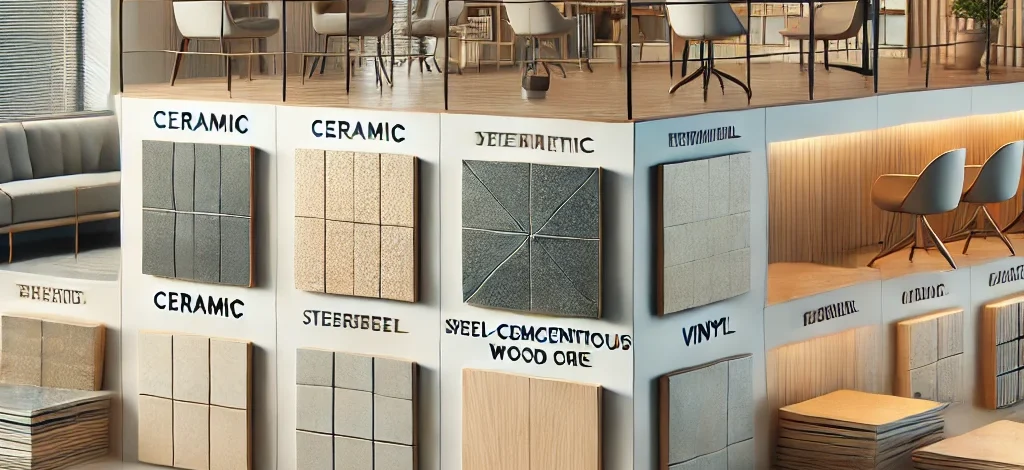Types of Raised Flooring Tiles: Which Material is Right for You?
Raised flooring tiles are an innovative solution for creating functional, flexible, and efficient spaces. These tiles come in various materials, each suited for specific environments and needs. Explore the different types of raised flooring tiles to determine which material is the perfect fit for your project. From durability to aesthetics, find out what makes each option stand out.
Types of Raised Flooring Tiles: Which Material is Right for You?
Raised flooring tiles are a modern marvel, enabling the creation of versatile, clutter-free spaces. Whether you’re designing an office, data center, or retail store, choosing the right material for your raised flooring tiles is crucial. Let’s dive into the types of raised flooring tiles and explore their unique benefits, so you can make an informed decision.
1. Ceramic Raised Flooring Tiles
Ceramic tiles offer unmatched elegance and durability. Ideal for high-end offices or showrooms, they’re resistant to scratches, stains, and moisture, ensuring a long-lasting, sophisticated look.
Advantages:
- Highly durable
- Easy to clean
- Aesthetic appeal
Drawbacks:
- Higher cost
- Can be brittle under excessive impact
2. Steel-Cementitious Raised Flooring Tiles
These tiles provide exceptional strength and load-bearing capacity, making them a top choice for data centers and industrial spaces. With a cement core and steel surface, they’re built to last.
Advantages:
- Excellent load capacity
- Fire-resistant
- Durable in heavy-traffic areas
Drawbacks:
- Limited design options
- Heavier installation process
3. Calcium Sulphate Raised Flooring Tiles
Known for their eco-friendliness and stability, calcium sulphate tiles are widely used in modern office setups. Their high density ensures minimal deformation over time.
Advantages:
- Environmentally friendly
- High stability and load capacity
- Excellent acoustic properties
Drawbacks:
- Susceptible to water damage
- Higher cost
4. Wood Core Raised Flooring Tiles
For spaces that require warmth and a natural feel, wood core tiles are a preferred option. They’re lightweight and versatile, offering both functionality and charm.
Advantages:
- Lightweight
- Attractive finish options
- Cost-effective
Drawbacks:
- Lower durability compared to other materials
- Not ideal for high-moisture areas
5. Vinyl-Finished Raised Flooring Tiles
These tiles combine practicality with style. The vinyl finish offers excellent resistance to wear and tear, making it a versatile choice for commercial spaces.
Advantages:
- Affordable
- Variety of designs and colors
- Easy to maintain
Drawbacks:
- May fade over time
- Lower heat resistance
How to Choose the Right Material
When selecting raised flooring tiles, consider the following:
- Environment: High-traffic areas require durable materials like steel or calcium sulphate.
- Aesthetics: For stylish spaces, ceramic or vinyl finishes add elegance.
- Functionality: Data centers or heavy-duty areas benefit from steel-cementitious tiles.
- Budget: Vinyl and wood-core options offer affordability without compromising functionality.
Raised Flooring Tiles Specifications
| Material | Key Features | Ideal For | Price Range |
|---|---|---|---|
| Ceramic | Scratch-resistant, elegant | High-end offices | $$$ |
| Steel-Cementitious | Fire-resistant, durable | Data centers, industries | $$$$ |
| Calcium Sulphate | Eco-friendly, stable | Modern offices | $$$$ |
| Wood Core | Lightweight, versatile | Warm interiors | $$ |
| Vinyl-Finished | Affordable, stylish | Retail, commercial spaces | $ |
Why Choose “Types of Raised Flooring Tiles: Which Material is Right for You?”
Choosing the right raised flooring tiles ensures:
- Enhanced functionality: Tailored to your specific needs.
- Improved aesthetics: A polished look that matches your design vision.
- Longevity: Durable materials reduce long-term maintenance costs.
- Flexibility: Easily adaptable to future changes.
With these benefits, it’s clear that understanding the types of raised flooring tiles can save you time, money, and effort while creating a modern, efficient space.
Pros and Cons Table
| Pros | Cons |
| Wide variety of materials and designs | Some materials can be costly |
| Enhances space functionality | Installation can be complex |
| Durable and long-lasting | Maintenance varies by material type |
| Aesthetic and professional appearance | Not all materials are moisture-resistant |
| Customizable to specific needs | Requires professional installation |
Product FAQs
1. What are raised flooring tiles? Raised flooring tiles are modular flooring solutions that create an elevated floor system, typically used to manage wiring, HVAC systems, or plumbing beneath.
2. Which material is best for high-traffic areas? Steel-cementitious tiles are ideal for high-traffic areas due to their exceptional load-bearing capacity and durability.
3. Are these tiles easy to maintain? Yes, most raised flooring tiles, such as vinyl or ceramic, are easy to clean and maintain.
4. Can raised flooring tiles be customized? Absolutely. Many materials, such as vinyl and wood-core tiles, offer various design and finish options.
5. Are raised flooring tiles eco-friendly? Calcium sulphate tiles are particularly eco-friendly, as they’re made from recycled materials.
Meta Information
Meta Title: Types of Raised Flooring Tiles: Choose the Right Material
Meta Description: Discover the types of raised flooring tiles and find the best material for your needs. Explore options like ceramic, steel-cementitious, and more for durable and stylish spaces.
